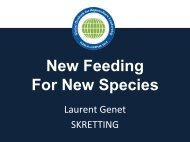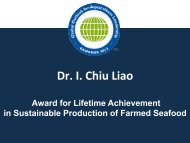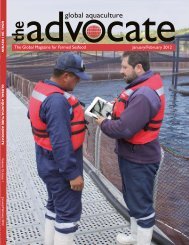May/June 2010 - Global Aquaculture Alliance
May/June 2010 - Global Aquaculture Alliance
May/June 2010 - Global Aquaculture Alliance
Create successful ePaper yourself
Turn your PDF publications into a flip-book with our unique Google optimized e-Paper software.
Cli CliCk k or Flip!<br />
DIGITAL ADVOCATE – FREE!<br />
You Can Now View<br />
Or Download The Advocate!<br />
global aquaculture Feeding the World Through<br />
Responsible <strong>Aquaculture</strong> Search the GAA Site<br />
DONATE NOW JOIN GAA<br />
Home About GAA About BAP Get Certified Members Magazine Newsroom Contact Us<br />
View our magazine online!<br />
January / February <strong>2010</strong> Issue<br />
View Online Download<br />
Please note that this digital edition requires flash player 8 or later<br />
If you do not have flash player 8 installed, you can download it from the<br />
following URL: http://getadobe.com/flashplayer<br />
Print/Digital Digital Only<br />
January/February March/April<br />
<strong>May</strong>/<strong>June</strong> July/August<br />
September/October November/December<br />
Enjoy the e-Advocate six times a year. Or join the <strong>Global</strong> <strong>Aquaculture</strong> <strong>Alliance</strong><br />
to also receive three printed issues by first-class mail. Either way, you get<br />
the best of responsible aquaculture – from GAA!<br />
While you’re looking, subscribe to GAA’s Update e-newsletter to receive e-mail notices<br />
when the next informative Advocate is available, as well as other important news<br />
on GAA activities around the world. It’s free, too.<br />
GO<br />
New GAA Directors Consider Integration<br />
At March Board Meeting<br />
During the Boston board meeting, Wally Stevens reviewed<br />
the growing status of the BAP program expressed on the “BAP<br />
at Work” signage displayed at the GAA trade show booth.<br />
The March 14 <strong>Global</strong> <strong>Aquaculture</strong> <strong>Alliance</strong> board of directors<br />
meeting began with a moment of silence in honor of Sir<br />
Barry Bowen, a distinguished founding supporter of GAA who<br />
died in a February plane crash. The meeting in Boston, Massachusets,<br />
USA, was well attended by GAA members from<br />
Europe, South America, Asia and the United States.<br />
New Directors<br />
Two new members have joined the GAA board. The slate of<br />
nominees for the GAA board presented by the Nominating<br />
Committee included replacements for Rick Martin and Erwin<br />
Sutanto, two exiting directors.<br />
The following were elected (or re-elected) to serve on the<br />
GAA board of directors:<br />
Lee Bloom, Eastern Fish Co.<br />
George Chamberlain, <strong>Global</strong> <strong>Aquaculture</strong> <strong>Alliance</strong><br />
Shah Faiez, Blue Archipelago (new nominee)<br />
John Galiher, Preferred Freezer Services<br />
Bill Herzig, Darden Restaurants<br />
Ole Norgaard, Alfesca (new nominee)<br />
Antonio Pino, Promarisco, S.A.<br />
Iain Shone, Lyons Seafoods Ltd.<br />
Bert Bachmann, Rittirong Boonmechote, Ray Jones, Alex<br />
Ko, Jordan Mazzetta, Sergio Nates, John Peppel, John Schramm<br />
and Wally Stevens will continue their terms as GAA directors.<br />
The following officers were approved at the meeting:<br />
Wally Stevens – Executive Director<br />
George Chamberlain – President<br />
Bill Herzig – Vice President<br />
Ole Norgaard – Secretary<br />
Lee Bloom – Treasurer<br />
The Nominating Committee also recommended expansion<br />
of the GAA Executive Committee from four members plus the<br />
executive director to six, plus the executive director. Modification<br />
of the GAA bylaws to accommodate the change was<br />
approved.<br />
Integration<br />
GAA Executive Director Wally Stevens reported that the<br />
success of the Best <strong>Aquaculture</strong> Practices program – as evidenced<br />
by new standards, more certified facilities and further<br />
penetration into the retail arena – is driving changes that will<br />
bring the <strong>Global</strong> <strong>Aquaculture</strong> <strong>Alliance</strong>, <strong>Aquaculture</strong> Certification<br />
Council (ACC) and new Responsible <strong>Aquaculture</strong> Foundation<br />
(RAF) into a tighter trinity.<br />
Since site inspections for Best <strong>Aquaculture</strong> Practices certification<br />
– formerly the responsibility of ACC – have passed to<br />
independent ISO-65-accredited certification bodies, the previously<br />
required definitive separation of GAA and ACC is no longer<br />
necessary. Closer cooperation between the two entities would<br />
make administration of the BAP program more efficient<br />
through the sharing of support services. The pending charitable<br />
status of the RAF can help subsidize the BAP standard-setting<br />
and training activities through foundation funding.<br />
In the integration, which has been approved by the GAA<br />
and ACC boards to phase in later this year, the <strong>Aquaculture</strong><br />
Certification Council will be renamed BAP Certification Management.<br />
As administrative and logistical manager for BAP certification,<br />
it will coordinate inspections, maintain records, monitor<br />
traceability and food safety data, and manage the use of the<br />
BAP mark on retail packaging for companies that participate in<br />
the program.<br />
The Responsible <strong>Aquaculture</strong> Foundation is expecting to<br />
receive charitable tax status – designated 501(c)(3) by the U.S.<br />
Internal Revenue Service – and begin operations soon. It will<br />
house the BAP Standards Oversight Committee that oversees<br />
the standards development process and the technical committees<br />
that develop individual standards. It will also assume primary<br />
responsibility for the training of BAP auditors and educational<br />
outreach to governments, trade associations, companies and<br />
individuals now carried out by ACC.<br />
Budgets<br />
Stevens said the projected budgets for GAA and ACC reflect<br />
the strong growth achieved by both organizations over the last<br />
decade. The current budgets do not adequately cover three areas<br />
tagged for growth in <strong>2010</strong>: Standards Oversight Committee<br />
technical committee work, BAP marketplace expansion and<br />
media coverage.<br />
Further budgets for primary project areas, as well as the need<br />
to establish minimum requirements for contingency funds<br />
retained for emergency reserve, will be reviewed by the GAA<br />
and RAF boards during GOAL <strong>2010</strong> in October.<br />
Strategic Planning<br />
Directors Peppel and Norgaard put forth the need to develop<br />
strategic plans for the next one, two and five years that outline<br />
annual goals for GAA. In examining the aspirations, resources<br />
and risks related to GAA’s execution of its mission, limiting factors<br />
can be identified and plans to address them can more effectively<br />
be formulated. Through strategic planning, the ultimate<br />
question is, how should GAA fit into the global aquaculture seafood<br />
community in five years?<br />
10 <strong>May</strong>/<strong>June</strong> <strong>2010</strong> global aquaculture advocate global aquaculture advocate <strong>May</strong>/<strong>June</strong> <strong>2010</strong> 11





